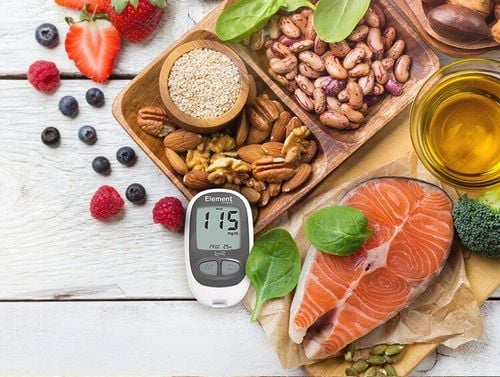This is an automatically translated article.
Diabetes is in endocrine diseases, high blood sugar due to disorders of blood sugar metabolism. People with diabetes gradually lose the ability to produce insulin - a hormone that helps lower blood sugar. It can be said that patients with diabetes have to live with this disease for the rest of their lives, so this is really a challenge. To avoid causing negative psychology for diabetics, you need to be careful not to say certain things to them.
1. You have diabetes because you eat too much sugar
Diabetes is not caused by eating too much sugar. Diabetes and its risk factors are complex. Type 1 diabetes is an autoimmune reaction in a person's body where the body's immune system attacks itself. The cause is genetic and other triggers have yet to be identified. Currently, there is no way to prevent the onset of type 1 diabetes. The onset of type 2 diabetes is due to genetics, lifestyle, and many unknown factors. Research has shown that we can prevent or delay type 2 diabetes for some people. However, there is no single cause or prevention strategy for all. So what is useful to say? Ask how you can support them in their diabetes care.
2. If you have diabetes, should you eat this dish?
Living with type 2 diabetes is a 24/7 job. We are always thinking about food and how our bodies react to the choices we make. But that doesn't mean we need control.
For example, just because an adult woman has type 2 diabetes doesn't mean she can never enjoy delicious food. It could be that if they're eating something they enjoy, they've planned it and are excited about it.
People living with diabetes must think about what they eat for each meal and snack. Sometimes it can be overwhelming. The basis of the diabetes food plan is a balanced diet. It's not just for people with diabetes, it's what's recommended for everyone. Avoid giving unsolicited advice, if you're trying to help someone reach their nutrition goal. Instead, make your own healthy food choices and have healthy food options ready when you share a meal.

Người bị tiểu đường cần có chế độ ăn uống cân bằng
3. Do you have to take insulin? Do you have severe diabetes?
Diabetes affects each person differently. Some people with diabetes must take medication to control the disease. Others can manage it with diet and exercise alone. Insulin injections do not mean a person has a more severe form of the disease. It also doesn't reflect how well they control their diabetes. People with type 1 diabetes need to take insulin several times per day, because their bodies don't produce any insulin. People with type 2 diabetes have insulin production, but the disease can change over time. That's why their medication needs can change. Someone with type 2 diabetes may need to start taking insulin to keep their blood sugar at a healthy level. There is no good or bad type of diabetes. Everyone with diabetes has different needs, and doctors monitor their health to help them choose the best foods, activities, and medications for them.
4. Hope you don't have diabetes complications like my relatives
Most patients diagnosed with type 2 diabetes are well aware of the complications that can arise from this condition. It is even possible to use this knowledge as a motivation to eat well, take medication as advised, and exercise more.
Hearing first-hand stories of diabetic complications can take that motivation away and turn it into fear, leaving them in a constant state of anxiety. Diabetics certainly already know the realities that come with this disease and are doing their best to stay optimistic and in control of the things they can like how they eat, how they move, how they think. think and how they react to others.
You do not need to highlight possible complications for them. Do not share stories of complications that others you know may have experienced. Health care groups and diabetes education programs help guide and support each person with diabetes. There have also been many advances in diabetes care that have reduced complication rates. In 2016, the US Food and Drug Administration approved the first artificial pancreas. Medtronic developed the device with the help of research from the International Diabetes Center. It continuously monitors blood sugar levels and also automatically adjusts the amount of insulin supplied to the body. The device delivers more insulin when a person's sugar is rising, it delivers less when sugar is going down. That makes for a person's blood sugar changes, for people with type 1 diabetes and their daily challenges in controlling blood glucose levels.

Bệnh nhân tiểu đường nên uống thuốc để tránh biến chứng nguy hiểm
5. You should lose weight to make your diabetes better
While weight loss can certainly help lower blood sugar in people with diabetes, it is not a cure-all.
Only by eating scientifically, living in moderation, exercising hard, and following your doctor's treatment regimen can your diabetes get better. Millions of people living with type 2 diabetes can already do this.
Diabetes is a chronic disease, people with the disease have to live with this disease for the rest of their lives. This is really a big challenge. Therefore, in order to avoid affecting the patient's psychology, you should pay attention to avoid saying a few things to them, pay attention and encourage them to always keep the best optimism.
Follow Vinmec International General Hospital website to get more health, nutrition and beauty information to protect the health of yourself and your loved ones in your family.
Please dial HOTLINE for more information or register for an appointment HERE. Download MyVinmec app to make appointments faster and to manage your bookings easily.













